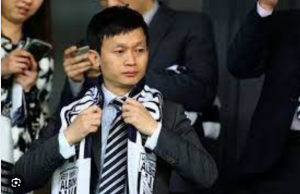It didn’t take long for Guochuan Lai to realise that people couldn’t be won over merely with free scarves and pints.
When he was announced as West Bromwich Albion’s new majority stakeholder in the summer of 2016, there was a great deal of hope. This esteemed club, a working-class and diverse Black Country bulwark, was savouring the glitz and wealth of the Premier League back then.
Jeremy Peace had overseen Albion’s sustainable model, but Peace was a shrewd businessman who understood the ins and outs of the football industry. Lai, who it became evident fairly early in his custody was not up to speed with running a football club that he could not, or would not, financially support, kept information about his personal wealth close to his chest and reiterated his intention to maintain Albion’s sustainable model.
Clearly, Albion was a desirable possibility. They had been in the top flight for six years running, and Chinese investment had taken a slight interest in the West Midlands. Of the four, Albion was the only Premier League team at the time, and they possessed a talented team. However, when it became known that Lai had paid more than £200 million to purchase the team, suspicions were aroused.
Not long after reaching the agreement with Peace, Lai participated in a Q&A session. “I want to become a serious owner, a great owner for West Bromwich Albion. I don’t want to be a pop star,” he declared. This endeavour is not self-serving. The idea here is to construct upon well-established foundations.” Seven and a half years later, Lai departs, purportedly pocketing a tenth of what he spent and having contributed to the destruction of those formerly strong foundations.

Loans’ swiftly turned into the deplorable catchphrase of Albion’s illustrious Lai chapter. More of a “we’ve lent you money, now you owe us it back and then some” kind of loan than the thrilling Romelu Lukaku and Harvey Barnes kind. Not only has Lai burdened the club with millions of pounds in debt in order to keep the lights on in recent years, but he also put more debt on himself by borrowing money from the club during Covid.
Furthermore, Lai inherited the “commercially attractive” amount that Holdings owed Group when it bought Peace’s interest; nevertheless, since that arrangement was made about eight years ago, an investigation has been approved. Not even the Warmfront Holdings company has been brought up.
The fan base has been irritated, scared, incensed, and disturbed by more than just the borrowing—it’s about what’s been put at danger. The club’s possessions, including its stadium and name, would be at risk if the borrowed funds were not repaid at a substantial interest rate. Football club owners are expected to look after their teams; they are frequently quite wealthy, but ultimately they are just stewards of the clubs. Instead, Lai put Albion in peril.

In light of this week’s news, Albion supporters should proceed with cautious optimism, as the hollow words and promises made during the beginning of his reign, broken down over the course of the following, coupled with a series of disastrous appointments at senior level with a number of those figures tasked with running the club day-to-day in his stead proved to be unfit for purpose, mean that
The evidence will be in the pudding when it comes to Shilen Patel and Bilkul Football WBA. Although it’s encouraging that he’s already dabbled in football ownership, where he already has an advantage over his predecessor, as is frequently the case in life, deeds speak louder than words. With Lai, Albion—whose aspirations have been somewhat muted since 2016—learned a valuable lesson.
Leave a Reply